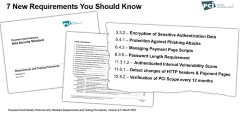Developer Portal
9 Interactive Requests
Payway supports secure web-based transactions for your applications. Many payment methods are available for interactive transactions, including payment wallets, and hosted payment entry which redirects credit card data entry to PaywayWS and eliminates the need for your server to receive any sensitive credit card data.
To support these transactions PaywayWS provides the ability to queue transactions. This sets up the transaction on PaywayWS and returns to you a paywayRequestToken. This token is what is passed to the browser, and an associated java script is used to send the account information entered by the user plus the transactionToken to PaywayWS.
The paywayRequestToken can be used ONLY once and ONLY for the transaction previously queued from your server. The user has no ability to change amounts or other transaction attributes.
See the related documents section at the beginning of this document for more information on Hosted Payment Entry and various wallet payment methods offered by PaywayWS.
9.1 Queue Sale Transaction
| JSON ‘request’ value | queueSale |
| DESCRIPTION | The queueSale request does not require a Payway session token. Your credentials are passed in this request and the paywayRequestToken, a one-time use token, is returned. After queueSale the card page is loaded and sendQueuedTransaction is called via a java script. |
| URL | URL /Payment/CreditCard |
| METHOD | Post |
| URL PARAMS | None |
| CONSUMES | text/json |
| PRODUCES | text/json |
| NOTES |
9.2 Queue Trial Authorize
| JSON ‘request’ value | queueTrialAuthorize |
| DESCRIPTION | queueTrialAuthorize request does not require a Payway session token. Credentials are passed in this request and the paywayRequestToken, a one-time use token, is returned along with the payway vault token corresponding to the customer’s credit card. This method can be used to verify a card account as well as generated a payway token that can be used in subsequent transactions. A queueTrialAuthorize performs a verification of $0.00 on the cardholder’s credit card. No credit hold is issued on the cardholder’s account. |
| URL | /Payment/CreditCard |
| METHOD | Post |
| URL PARAMS | None |
| CONSUMES | text/json |
| PRODUCES | text/json |
| NOTES | This method can only be used where the accountInputMode is the primaryAccount Number. This feature must be enabled by payway prior to production requests. |
9.3 Queue Trial Authorize
| JSON ‘request’ value | queueTrialAuthorize |
| DESCRIPTION | queueTrialAuthorize request does not require a Payway session token. Credentials are passed in this request and the paywayRequestToken, a one-time use token, is returned along with the payway vault token corresponding to the customer’s credit card. This method can be used to verify a card account as well as generated a payway token that can be used in subsequent transactions. A queueTrialAuthorize performs a verification of $0.00 on the cardholder’s credit card. No credit hold is issued on the cardholder’s account. |
| URL | /Payment/CreditCard |
| METHOD | Post |
| URL PARAMS | None |
| CONSUMES | text/json |
| PRODUCES | text/json |
| NOTES | This method can only be used where the accountInputMode is the primaryAccount Number. This feature must be enabled by payway prior to production requests. |
9.4 Queue Authorize Transaction
| JSON ‘request’ value | queueAuthorize |
| DESCRIPTION | The queueAuthorize request does not require a Payway session token. Your credentials are passed in this request and the paywayRequestToken, a one-time use token, is returned. After queueAuthorize the card page is loaded and sendQueuedTransaction is called via a java script. A background capture request must be executed on a successful authorize for the sale to be completed funds deposited. |
| URL | /Payment/CreditCard |
| METHOD | Post |
| URL PARAMS | None |
| CONSUMES | text/json |
| PRODUCES | text/json |
| NOTES |
9.5 Queue Credit Transaction
| JSON ‘request’ value | queueCredit |
| DESCRIPTION | The queueCredit request does not require a Payway session token. Your credentials are passed in this request and the paywayRequestToken, a one-time use token, is returned. |
| URL | /Payment/CreditCard |
| METHOD | Post |
| URL PARAMS | None |
| CONSUMES | text/json |
| PRODUCES | text/json |
| NOTES |
9.6 Send Queued Transaction
| JSON ‘request’ value | sendQueuedTransaction |
| DESCRIPTION | This request will send a previously queued transaction. Account information entered by the user is passed in this request. |
| URL | /Payment/CreditCard |
| METHOD | Post |
| URL PARAMS | None |
| CONSUMES | text/json |
| PRODUCES | text/json |
| NOTES | The form of the account data depends on the payment method the user has chosen. It could be primary account data, Apple Pay encrypted data, Google Pay data, or P2PE encrypted data. This is sent from the browser via a java script when the user clicks on a particular button to make the payment. See the various wallet and payment method integration guides for more information. |
9.10 Get Hosted Transaction Results
| JSON ‘request’ value | hostedTransactionResults |
| DESCRIPTION | The hostedTransactionResults request is executed from the browser and returns only the result code and a possible text error message. |
| URL | /Query/CreditCard |
| METHOD | Post |
| URL PARAMS | None |
| CONSUMES | text/json |
| PRODUCES | text/json |
| NOTES | This request is executed from your server and returns all fields for the related transaction. Account sensitive data is masked, and internal fields used only by PaywayWS are not returned. |
9.11 Queue Add Account Request
| JSON ‘request’ value | queueAddAccount |
| DESCRIPTION | To allow interactive web users to add a payment account, you first have to set up a queueAddAccount request from your server to PaywayWS. This is similar to the queueSale type requests described above. A paywayRequestToken is returned to be sent to PaywayWs with the account information the users add. |
| URL | Account/CreditCard |
| METHOD | Post |
| URL PARAMS | None |
| CONSUMES | text/json |
| PRODUCES | text/json |
| NOTES | NOTES If you are participating in the PaywayWS Account Updater program, any updates to the related account, such as a new expiration date, are applied to the original token. You do not have to acquire a new token for the updated account. |
9.12 Send Queued Add Account Request
| JSON ‘request’ value | sendQueuedAddAccount |
| DESCRIPTION | Called from a browser java script which redirects the primary account number input directly to PaywayWS. |
| URL | Account/CreditCard |
| METHOD | Post |
| URL PARAMS | None |
| CONSUMES | text/json |
| PRODUCES | text/json |
| NOTES | The format of the data depends on the account input method. |
9.13 Get Hosted Add Account Results
| JSON ‘request’ value | hostedAddAccountResults |
| DESCRIPTION | Used in conjunction with queueAddAccount and sendAddAccount to execute a web-based hosted add account request. This request will return all fields for the related payment account. |
| URL | /Query/CreditCard |
| METHOD | Post |
| URL PARAMS | None |
| CONSUMES | text/json |
| PRODUCES | text/json |
| NOTES | Sensitive data is masked, and internal fields used only by PaywayWS are not returned. |
9.14 getApplePaySession
This request is called only from the ApplePay.js java script provided for integrations with PaywayWS ApplePay. See the ApplePay integration guide for more information.
| JSON ‘request’ value | getApplePaySession |
| DESCRIPTION | DESCRIPTION Validates Apple pay merchant based upon your domain and returns Apple pay session data. |
| URL | /Session |
| METHOD | Post |
| URL PARAMS | None |
| CONSUMES | text/json |
| PRODUCES | text/json |
| NOTES |


